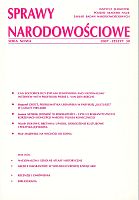Can Sociobiology Explain Xenophobia and Nationalism? Interview with Professor Pierre L. van den Berghe
Can Sociobiology Explain Xenophobia and Nationalism? Interview with Professor Pierre L. van den Berghe
Author(s): Veronika Bajt, Pierre L. Berghe, van den, Damjan MandelcSubject(s): Cultural Essay, Political Essay, Societal Essay
Published by: Instytut Slawistyki Polskiej Akademii Nauk
Keywords: P.L. van den Berghe; sociobiology; xenophobia; nationalism; primordialists
Summary/Abstract: Pierre L. van den Berghe was born in 1933 in Congo, Africa. He was awarded United States of America citizenship in 1955 and lives in Seattle with his German wife. Fluent in French, English, Spanish and German, Prof. van den Berghe is a child of a mixed marriage, who also speaks Swahili, Dutch, Afrikaans and Portugues. He studied at prestigious universities of Stanford, Sorbonne and Harvard. He had lectured across the U.S., in South Africa, Kenya, Nigeria, Israel, Australia, Germany, etc. He is Professor Emeritus of the University of Washington. Professor van den Berghe is a sociologist, but considered controversial because of his insistence on the necessity to expand the social scientist’s knowledge of natural sciences, especially biology. For many years he has been involved with the so-called sociobiology, a discipline that does not strictly separate the study of humans from the wider context of the evolutionary theory. Within the field of nationalism studies, van den Berghe is often labelled a “primordialist.” This term is used for those who seek for causes of nationalism not only in relation to the past two centuries of human existence (the so-called “modernists”) but dig for answers deeper into the human history. The still very vibrant and exuberant professor visited the University of Ljubljana in May 2005, where he gave a few lectures on sociobiology. Pierre L. van den Berghe urodził się w 1933 r. w Kongo w Afryce. W 1955 r. uzyskał obywatelstwo amerykańskie i obecnie mieszka w Seattle wraz z żoną Niemką. Biegle mówi po francusku, angielsku, hiszpańsku i niemiecku. Urodzony w mieszanym narodowo małżeństwie, zna także języki: swahili, niderlandzki, afrikaans, portugalski. Studiował na prestiżowych uniwersytetach Stanforda, Sorbona i Harvarda. Wykładał między innymi w całych Stanach Zjednoczonych, w Republice Południowej Afryki, Kenii, Nigerii, Izraelu, Australii, Niemczech. Obecnie jest Professor Emeritus University of Washington (Seattle). Profesor van den Berghe jest socjologiem, uznawanym za kontrowersyjnego z racji nacisku, jaki kładzie na konieczność poszerzenia wiedzy badaczy zajmujących się naukami społecznymi o zakres nauk ścisłych, a zwłaszcza biologii. Od wielu lat zajmuje się tak zwaną socjobiologią – dyscypliną, która badań naukowych nad człowiekiem nie oddziela ściśle od szerszego kontekstu teorii ewolucji. Jako badacz nacjonalizmu van den Berghe bywa nazywany „prymordialistą” (inaczej: „esencjonalistą“). Tym terminem określani są badacze, którzy genezy procesów narodowościowych dopatrują się nie tylko w minionych dwóch stuleciach dziejów człowieka (tzw. „moderniści”), lecz poszukując odpowiedzi, wnikają głębiej w przeszłość ludzkości. Profesor van den Berghe, wciąż bardzo aktywny i tryskający energią, był gościem Uniwersytetu w Lublianie w maju 2005 r. Wygłosił wówczas kilka wykładów z socjobiologii i udzielił publikowanego tu wywiadu.
Journal: Sprawy Narodowościowe
- Issue Year: 2007
- Issue No: 30
- Page Range: 7-22
- Page Count: 16
- Language: English

